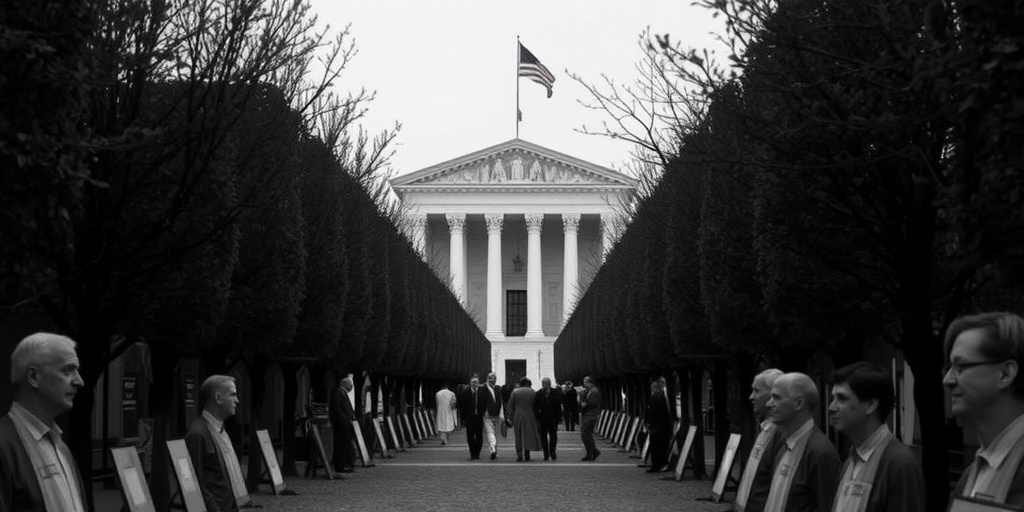Now Reading: Supreme Court Dismisses Holocaust Survivors’ Lawsuit Against Hungary
-
01
Supreme Court Dismisses Holocaust Survivors’ Lawsuit Against Hungary
Supreme Court Dismisses Holocaust Survivors’ Lawsuit Against Hungary

The U.S. Supreme Court delivered a unanimous ruling on Friday, denying a group of Jewish survivors of the Holocaust the ability to sue Hungary in United States courts for the recovery of property stolen during World War II. This ruling comes in light of the Hungarian state-owned railway’s actions that led to the theft of property from hundreds of thousands of Jews before their deportation to Nazi death camps in 1944.
The case addressed a pivotal question concerning the Foreign Sovereign Immunities Act (FSIA), a law enacted in 1976 that generally protects foreign nations from being sued in U.S. courts. The FSIA does provide certain exceptions, such as for cases involving the expropriation of property; however, it stipulates that the stolen property must have been directly exchanged for goods or services in the U.S. as part of a commercial activity.
Historically, the context of the Holocaust is grim. Over half a million Hungarian Jews fell victim to mass murder in the swift genocidal campaign carried out by the Hungarian government and its institutions. This campaign was characterized by systematic theft, with the Hungarian railway orchestrating the confiscation of Jewish property following a government declaration that all valuable possessions, apart from a few personal items, were deemed national assets.
The plaintiffs in this case—comprising Holocaust survivors and their descendants—asserted that the assets stolen from them had been liquidated and later integrated with other financial resources. They argued that this mixture of funds was subsequently utilized over the decades in various commercial dealings with the United States, such as through the issuance of bonds and the purchasing of military equipment.
However, Justice Sonia Sotomayor, writing for the court, determined that the link between the stolen property and the transactions in the U.S. was too tenuous to hold up under legal scrutiny. She stated, “Hungary has made countless transactions throughout several institutional collapses and regime changes, resulting in billions in revenues flowing in and out of its treasury.” Sotomayor indicated that the mere act of commingling funds from the 1940s did not establish a direct connection to transactions that occurred in the 2000s, when funds allegedly originating from stolen property were spent in the United States.
Sotomayor elaborated on this distinction, noting that it is one thing to trace a stolen piece of artwork through a series of exchanges, but quite another to simply sell that artwork, deposit the resulting cash, and use that account for various transactions without clear evidence of linkage. She emphasized that the plaintiffs failed to provide sufficient evidence enabling a reasonable tracing of the proceeds back to the original stolen property.
In her opinion, while there exists a “moral imperative” to seek justice for the victims of the Holocaust, the broad interpretation of the law proposed by the plaintiffs could potentially jeopardize the United States’ foreign relations and its reciprocal self-interests. The U.S. faces a multitude of lawsuits from abroad, with around 1,800 cases pending against it in over 100 countries at any time. The Biden administration, which supported the Hungarian government in this case, highlighted the importance of safeguarding foreign states from civil lawsuits in U.S. courts to avoid entangling the nation in costly international legal disputes.
Justice Sotomayor also suggested that alternative avenues might exist for victims seeking compensation. Citing insights from a brief submitted by the U.S. government, she noted that maintaining respect for the limits outlined in the FSIA could facilitate efforts for foreign nations to develop proper redress mechanisms for victims of human rights violations, including those suffered during the Holocaust.
Despite some progress, the government’s brief acknowledged that efforts to secure compensation for Holocaust victims have had limited success. The Hungarian government, however, has made some provisions for compensating its Jewish population for the wrongs committed during the Nazi era.
The Supreme Court’s ruling thus underscores the complex interplay between international law, foreign relations, and the quest for justice by historical victims. While the legal pathway for Holocaust survivors seeking redress in U.S. courts remains shut, the dialogue around compensation and acknowledgment of past atrocities continues to evolve.
Stay Informed With the Latest & Most Important News
Previous Post
Next Post
-
 01New technology breakthrough has everyone talking right now
01New technology breakthrough has everyone talking right now -
 02Unbelievable life hack everyone needs to try today
02Unbelievable life hack everyone needs to try today -
 03Fascinating discovery found buried deep beneath the ocean
03Fascinating discovery found buried deep beneath the ocean -
 04Man invents genius device that solves everyday problems
04Man invents genius device that solves everyday problems -
 05Shocking discovery that changes what we know forever
05Shocking discovery that changes what we know forever -
 06Internet goes wild over celebrity’s unexpected fashion choice
06Internet goes wild over celebrity’s unexpected fashion choice -
 07Rare animal sighting stuns scientists and wildlife lovers
07Rare animal sighting stuns scientists and wildlife lovers




















